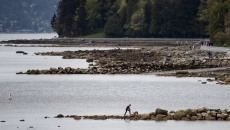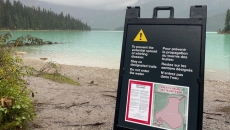The inflation rate fell to 2.7 per cent in June, but the pace of growth in grocery prices accelerated for the second month in a row.
Statistics Canada reports grocery prices rose 2.1 per cent year-over-year in June, up from May's increase of 1.5 per cent.
This is the last inflation report before the Bank of Canada's next interest rate decision next Wednesday.
Inflation came down last month, beating out expectations.
— Justin Trudeau (@JustinTrudeau) July 17, 2024
But, until Canadians can feel that relief in their wallets, at the grocery store, and on their mortgages, the job’s not done.
C-I-B-C senior economist Katherine Judge says this morning's data gives the Bank of Canada what it needs in order to cut interest rates.
B-MO macro strategist Benjamin Reitzes predicts it will be a bit of a grind to reach the central bank's target of annual inflation rate of two per cent and doesn't think it will hit that mark before mid-to-late next year.
Canada's annual inflation rate was 2.7 per cent in June, Statistics Canada says. The agency also released rates for major cities, but cautioned that figures may have fluctuated widely because they are based on small statistical samples (previous month in brackets):
— St. John's, N.L.: 2.8 per cent (3.2)
— Charlottetown-Summerside: 3.7 per cent (3.4)
— Halifax: 3.6 per cent (3.8)
— Saint John, N.B.: 2.6 per cent (2.7)
— Quebec City: 2.2 per cent (3.0)
— Montreal: 2.5 per cent (3.2)
— Ottawa: 2.7 per cent (2.7)
— Toronto: 3.4 per cent (3.4)
— Thunder Bay, Ont.: 1.6 per cent (2.2)
— Winnipeg: 1.5 per cent (1.4)
— Regina: 1.4 per cent (1.5)
— Saskatoon: 1.9 per cent (1.5)
— Edmonton: 2.7 per cent (2.8)
— Calgary: 3.6 per cent (3.6)
— Vancouver: 2.3 per cent (3.1)
— Victoria: 2.9 per cent (2.9)
— Whitehorse: 1.9 per cent (2.3)
— Yellowknife: 1.8 per cent (2.6)
— Iqaluit: 1.0 per cent (0.6)
Canada's annual inflation rate was 2.7 per cent in June, Statistics Canada says. Here's what happened in the provinces (previous month in brackets):
— Newfoundland and Labrador: 2.3 per cent (2.6)
— Prince Edward Island: 3.4 per cent (3.2)
— Nova Scotia: 3.5 per cent (3.7)
— New Brunswick: 2.8 per cent (2.9)
— Quebec: 2.2 per cent (3.1)
— Ontario: 3.0 per cent (3.0)
— Manitoba: 1.4 per cent (1.3)
— Saskatchewan: 1.4 per cent (1.5)
— Alberta: 3.0 per cent (3.0)
— British Columbia: 2.6 per cent (2.9)






